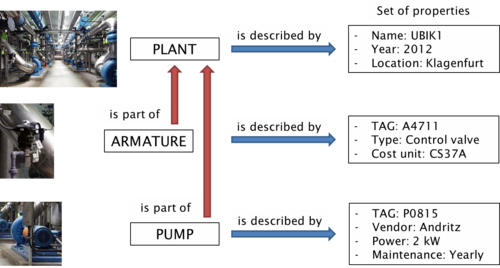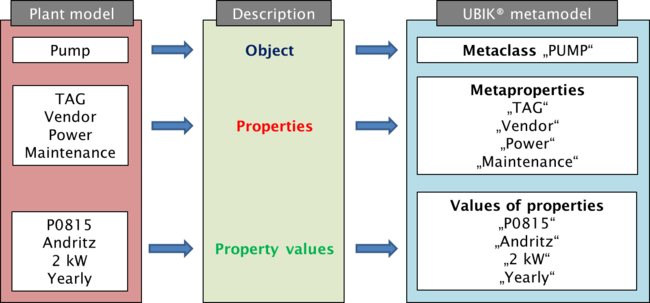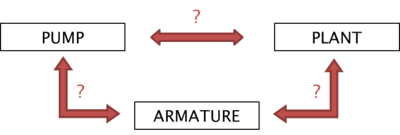Difference between revisions of "Entity Data Model"
(→Relating objects) |
(→Relating objects) |
||
| Line 104: | Line 104: | ||
| #1 || style="width: 80px;" | P0815 || style="width: 100px;" | Andritz || style="width: 50px;" align="right" | 2 kW || Yearly || style="width: 80px; background-color: #C3D69B" | UBIK1 | | #1 || style="width: 80px;" | P0815 || style="width: 100px;" | Andritz || style="width: 50px;" align="right" | 2 kW || Yearly || style="width: 80px; background-color: #C3D69B" | UBIK1 | ||
|- align="center" | |- align="center" | ||
| − | | #2 || P0816 || Andritz || align="right" | 5 kW || Monthly || UBIK1 | + | | #2 || P0816 || Andritz || align="right" | 5 kW || Monthly || style="background-color: #C3D69B" | UBIK1 |
|- align="center" | |- align="center" | ||
| − | | #3 || P0817 || Sulzer || align="right" | 4 kW || Yearly || UBIK1 | + | | #3 || P0817 || Sulzer || align="right" | 4 kW || Yearly || style="background-color: #C3D69B" | UBIK1 |
|} | |} | ||
</td> | </td> | ||
Revision as of 14:39, 18 December 2012
Contents
Introduction
Objectives
In an industrial environment we quite often need to
- describe an industrial plant consisting of a bunch of different parts, each having a certain purpose and set of properties, and which are related in various ways
- manage process or maintenance data of the plant and its features
- do a high-performance cost-benefit analysis and create key performance indicators
Therefore we need to
15 px „Dissemble“ the system into theoretical blocks representing the real as well as intangible parts of the system.
15 px Identify the necessary properties of the blocks.
15 px Think about how blocks are possibly related to each other.
15 px Think about the functions and features of blocks.
Plant picture
Lets start with a simple picture and assume that our plant consists of a pump and an armature. Both equipments exhibit certain technical or other properties, which our datamodel must contain in some form. Additionally the datamodel has to provide mechanism to indicate the circumstances that both equipments are parts of the plant and maybe even be related to each other.
For our first example plant, the pump and armature we find the following definitions
Looking closer at the "PUMP" block reveals its properties and property values
Of course, a real plant consists of multiple pumps, each described with the same set of properties (TAG, vendor, power, maintenance data). The real pumps in the plant are distinguished by different property values as given in the table.
| Pump | TAG | Vendor | Power | Maintenance |
|---|---|---|---|---|
| #1 | P0815 | Andritz | 2 kW | Yearly |
| #2 | P0816 | Andritz | 5 kW | Monthly |
| #3 | P0817 | Sulzer | 4 kW | Yearly |
We can redefine or extend our objectives by
15 px
Design a descriptive model including all required blocks and properties of the system
15 px An object in this model specifies possible properties for a certain part of the real system
From the plant picture to UBIK
Transition
In summary we can picture the transition from the plant picture into an object- / data-model like
and post our first definition
- UBIK metamodel
- A descriptive model, where objects provide information about the aspects of the data, is also called “Metamodel”.
Intermediate summary I
So far we have identified
20 px Theoretical blocks representing the parts of the system
20 px Necessary properties of these blocks
An important aspect of the datamodel has not been discussed yet, namley
20 px How are the blocks (=metaclasses) related to each other?
Relating objects
Assuming that all three pumps are clearly parts of the plant „UBIK1“, the descriptive model has to be extended in order to include this information as well. In our "table" view we account for this by adding a property to the „Pump“ block refering to the plant. This additional property represents the link information between the pumps #1 - #3 and the plant „UBIK1“.
 |
20 px |
|





